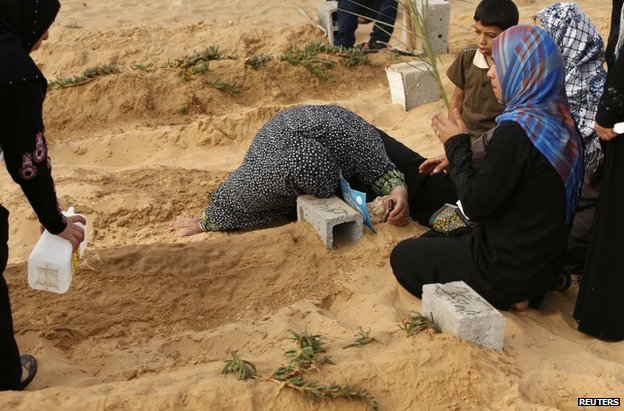
An emergency session backed a statement calling for a truce over the Muslim holiday of Eid al-Fitr “and beyond”. Both the Palestinian and Israeli envoys to the UN criticised the statement, for different reasons. Gaza had its quietest night in weeks after a weekend punctuated by brief truce initiatives offered by both Israel and Hamas. More than 1,030 Palestinians, mostly civilians, and 43 Israeli soldiers and two Israeli civilians have been killed. A Thai national in Israel has also died. The Gaza health ministry on Sunday revised the number of Palestinian dead down by 30 after some relatives found missing family members. At the scene: Martin Patience, BBC News, Gaza The big hope here is that the patchwork of ceasefires we have seen in the past couple of days will become more sustainable and durable, that through international pressure we will see the ceasefires hold and hostilities end. This was perhaps the quietest night in the Gaza Strip that we’ve seen in the three weeks since this operation began. Today marks the start of Eid al-Fitr, the end of Ramadan, and it is a festival which is supposed to last three days, so people here will certainly welcome the quiet. But the reality is that there is not a great deal to celebrate in Gaza. More than 1,000 Palestinians have been killed in the fighting, most of them civilians. More than 100,000 Palestinians have been displaced from their homes. So people will welcome this respite but there is still uncertainty. ‘Durable’ truce The UN Security Council endorsed a statement from Rwanda, the current president of the council, calling for a “durable” truce based on an Egyptian initiative – under which a pause in hostilities would lead to substantive talks on the future of Gaza, including the opening of Gaza’s border crossings. Jump media player Media player help Out of media player. Press enter to return or tab to continue. Orla Guerin reports on Israel’s response to rocket attacks The statement also emphasised that “civilian and humanitarian facilities, including those of the UN, must be respected and protected”. It further stressed the need for “immediate provision of humanitarian assistance to the Palestinian civilian population in the Gaza Strip”. The Palestinian representative at the UN, Riyad Mansour, said the statement did not go far enough and that a formal resolution was needed demanding that Israel withdraw its forces from Gaza. “They should have adopted a resolution a long time ago to condemn this aggression and to call for this aggression to be stopped immediately,” he said. Speaking for Israel, Ron Prosor accused the Security Council statement of bias. “Miraculously it doesn’t mention Hamas,” the Israeli envoy said. “It doesn’t mention the firing of rockets. Those things are lacking in this statement.” Opinion polls published at the weekend suggest there is still widespread support among Israelis for the military operation. While Israel’s Prime Minister Benjamin Netanyahu is facing increasing international pressure for a long-term ceasefire with Hamas, at home there is strong public support for the army’s offensive in Gaza. A poll published by Israel’s Channel 10 television on Sunday said 87% of Israelis were in favour of continuing the Gaza operation – and just 7% wanted a full ceasefire. There are concerns about the rising number of casualties among Israeli soldiers but people here want the rocket fire on Israel to stop. The sound of sirens over central and southern Israel has become part of everyday life. And many are very concerned about the new threat posed by the network of cross border tunnels from Gaza. At her home on a kibbutz close to the Gaza border, one woman said she was afraid. Rockets can be intercepted by Iron Dome, she told me, referring to Israel’s missile defence system. “But there’s no Iron Dome protection against Hamas fighters coming up through the tunnels to kidnap and kill us.” Pressure on Obama US President Barack Obama called for an immediate, unconditional humanitarian ceasefire in a phone call to Israeli Prime Minister Benjamin Netanyahu on Sunday. A long-term solution, he added, would have to allow “Palestinians in Gaza to lead normal lives” and “must ensure the disarmament of terrorist groups and the demilitarisation of Gaza”. Mr Obama may have felt compelled to make the call after some embarrassment to his Secretary of State, John Kerry, in Israel, the BBC’s Aleem Maqbool reports from Washington. Mr Kerry’s ceasefire plan was rejected, and his character was attacked in sections of the Israeli media. Mr Obama may also feel that after a weekend where brief ceasefires helped expose the full extent of the destruction in parts of Gaza, he had to be seen to be condemning it, our correspondent adds. Israel launched its military offensive on 8 July with the declared objective of stopping Hamas, the Islamist group which controls Gaza, firing rockets from Gaza into Israel. On 18 July, it extended operations with a ground offensive, saying it was necessary to destroy tunnels dug by militants to infiltrate Israel. — BBC Online

